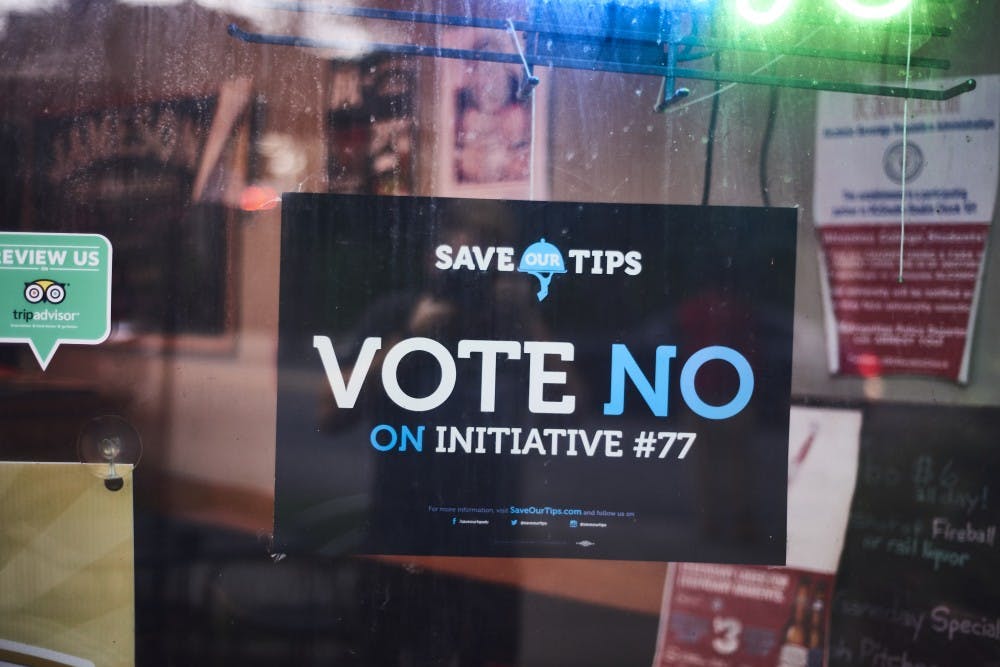Initiative 77, a measure that would increase the minimum wage for bartenders and servers who rely on tips, was overturned by the D.C. Council on Oct. 2. The initiative was originally passed by voters in June.
The D.C. Council approved legislation repealing Initiative 77 by a vote of 8-5, the first of two necessary votes, The Washington Post reported. D.C. Mayor Muriel E. Bowser said she would sign the repeal legislation.
Advocates of Initiative 77 said it was meant to help workers across tipped wage industries, with the bill set to increase the minimum wage employers pay their tipped waged employees from $3.89 an hour to $15 an hour by 2020.
Christian Paolini, an AU student and bartender at Barcelona Wine Bar, is not sure where he stands on the issue.
“The whole idea of us having a regular wage is appealing in some aspects because the issue with tips is that they are unreliable,” Paolini said.
Some days Paolini makes $315 in tips per shift but on others he only walks away with $25, he said. While Paolini finds a predictable and reliable wage desirable, he thinks the new law will reduce his overall take-home pay.
Local bartender and student Harry Wright echoes this sentiment. He believes that the implementation of Initiative 77 would lead to “a loss in overall wages and an exodus of talent” of bartenders and servers within D.C.
Wright argues that the measure would have unfairly hurt small businesses who rely on tips to generate income for their employees. He said the real problem at hand isn’t raising the floor for minimum wage but “actual wage enforcement.”
Student server Tom Friedl on the other hand, disagrees. Given how slowly the new system would be phased in, he doesn’t think Initiative 77 would have had much of an impact to his wages.
But he said that the initiative would have allowed workers the ability to handle difficult customer interactions without having to worry about a bad tip, since restaurant owners would be required to pay the entirety of their employees wages.
“[It’s] insane that we’re okay with a system in which we have to beg and scrape like feudal servants,” Friedl said.
The D.C. Council’s decision to repeal the measure will impact not only the lives of AU students, but also the D.C. community involved in the food service industry.
Kaz Okochi, owner of Kaz Sushi Bistro on I St. NW, was one of the advocates for repealing Initiative 77. Okochi believes the repealed ballot measure would not help servers earn increased wages since D.C. laws already require employers to pay their workers minimum wage.
“Employers are required to pay the difference if they don’t receive the minimum through tips alone,” Okochi said.
He said the law may have had the opposite effect. By forcing employers to pay increased costs for labor, Okochi fears that he may have to have been obliged to raise the prices he charges his customers.
Restaurant owners and servers are concerned that the increased labor costs may force restaurants to add service charges to checks, Okochi said. They believe that doing so may, in turn, cause customers to stop tipping, reducing overall take-home pay for restaurant workers.
John Snedden, owner of Right Proper Brewing in Shaw, asks: “Do you think you should tip when you see a service charge included at the bottom of your check?”
Ericka Taylor, the D.C. Council liaison for the One Fair Wage Coalition, disagrees with the points argued by Snedden and Okochi.
“Restaurants don’t have to use or run a model using a service fee,” Taylor said. “The issue [at hand] is not tips but increasing the minimum wage.”
Taylor said restaurants don’t need to be forced to have a lower minimum wage than other industries. She believes that the restaurant industry has always been reluctant to adapt to changes.
The new wage model has already been met with success in other cities across the country, Taylor said She urges opponents to Initiative 77 to look at examples in places like Seattle and San Francisco to see the overall positive impact such laws have had.
While Taylor agrees that overall costs to consumers will increase, she believes those increases will be minimal—amounting to mere dollars and cents.
“Are you going to tip less in one place over another because of a wage difference?” she said.




